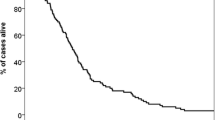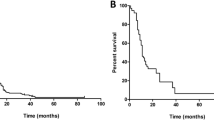Abstract
Objective|
To assess prognostic factors and validate the effectiveness of recursive partitioning analysis (RPA) classes and graded prognostic assessment (GPA) in 290 non-small cell lung cancer (NSCLC) patients with brain metastasis (BM).
Methods
From Jan 2008 to Dec 2009, the clinical data of 290 NSCLC cases with BM treated with multiple modalities including brain irradiation, systemic chemotherapy and tyrosine kinase inhibitors (TKIs) in two institutes were analyzed. Survival was estimated by Kaplan-Meier method. The differences of survival rates in subgroups were assayed using log-rank test. Multivariate Cox’s regression method was used to analyze the impact of prognostic factors on survival. Two prognostic indexes models (RPA and GPA) were validated respectively.
Results
All patients were followed up for 1-44 months, the median survival time after brain irradiation and its corresponding 95% confidence interval (95% CI) was 14 (12.3–15.8) months. 1-, 2- and 3-year survival rates in the whole group were 56.0%, 28.3%, and 12.0%, respectively. The survival curves of subgroups, stratified by both RPA and GPA, were significantly different (P<0.001). In the multivariate analysis as RPA and GPA entered Cox’s regression model, Karnofsky performance status (KPS) ≥ 70, adenocarcinoma subtype, longer administration of TKIs remained their prognostic significance, RPA classes and GPA also appeared in the prognostic model.
Conclusion
KPS ≥70, adenocarcinoma subtype, longer treatment of molecular targeted drug, and RPA classes and GPA are the independent prognostic factors affecting the survival rates of NSCLC patients with BM.
Similar content being viewed by others
References
Posner JB. Management of brain metastases. Rev Neurol 1992; 148: 477–487.
Walker AE, Robins M, Weinfeld FD. Epidemiology of brain tumors: the national survey of intracranial neoplasms. Neurology 1985; 35: 219–226.
Davey P. Brain metastases: treatment options to improve outcomes. CNS Drugs 2002; 16:325–338.
Shahidi H, Kvale PA. Long-term survival following surgical treatment of solitary brain metastasis in non-small cell lung cancer. Chest 1996; 109: 271–276.
Gaspar LE, Mehta MP, Patchell RA, et al. The role of whole brain radiation therapy in the management of newly diagnosed brain metastases: a systematic review and evidence-based clinical practice guideline. J Neurooncol 2010; 96:17–32.
Stafinski T, Jhangri GS, Yan E, et al. Effectiveness of stereotactic radiosurgery alone or in combination with whole brain radiotherapy compared to conventional surgery and/or whole brain radiotherapy for the treatment of one or more brain metastases: a systematic review and meta-analysis. Cancer Treat Rev 2006; 32:203–213.
Linskey ME, Andrews DW, Asher AL, et al. The role of stereotactic radiosurgery in the management of patients with newly diagnosed brain metastases: a systematic review and evidence-based clinical practice guideline. J Neurooncol 2010; 96:45–68.
Kalkanis SN, Kondziolka D, Gaspar LE, et al. The role of surgical resection in the management of newly diagnosed brain metastases: a systematic review and evidence-based clinical practice guideline. J Neurooncol 2010; 96:33–43.
Souquet PJ, Chauvin F, Boissel JP, et al. Polychemotherapy in advanced non small cell lung cancer: a meta-analysis. Lancet 1993; 342:19–21.
Kim DY, Lee KW, Yun T, et al. Efficacy of platinum based chemotherapy after cranial radiation in patients with brain metastases from non-small cell lung cancer. Oncol Rep 2005; 14:207–211.
Kim KH, Lee J, Lee JL, et al. Can upfront systemic chemotherapy replace stereotactic radiosurgery or whole brain radiotherapy in the treatment of non-small cell lung cancer patients with asymptomatic brain metastases? Lung Cancer 2010; 68:258–263.
Mehta MP, Paleologos NA, Mikkelsen T, et al. The role of chemotherapy in the management of newly diagnosed brain metastases: a systematic review and evidence-based clinical practice guideline. J Neurooncol 2010; 96:71–83.
Ceresoli GL, Cappuzzo F, Gregorc V, et al. Gefitinib in patients with brain metastases from non-small-cell lung cancer: a prospective trial. Ann Oncol 2004; 15:1042–1047.
Rosell R, Taron M, Sanchez JJ, et al. Setting the benchmark or tailoring treatment with EGFR tyrosine kinase inhibitors. Future Oncol 2007; 3:277–283.
Fekrazad MH, Ravindranathan M, Jones DV Jr. Response of intracranial metastases to erlotinib therapy. J Clin Oncol 2007; 25:5024–5026.
von Pawel J, Wagner H, Duell T, et al. Erlotinib in patients with previously irradiated, recurrent brain metastases from non-small cell lung cancer: two case reports. Onkologie 2008; 31:123–126.
Gounant V, Wislez M, Poulot V, et al. Subsequent brain metastasis responses to epidermal growth factor receptor tyrosine kinase inhibitors in a patient with non-small-cell lung cancer. Lung Cancer 2007; 58:425–428.
Nishi N, Kawai S, Yonezawa T, et al. Effect of gefitinib on brain metastases from non-small cell lung cancer. Neurol Med Chir 2006; 46:504–507.
Gaspar L, Scott C, Rotman M, et al. Recursive partitioning analysis (RPA) of prognostic factors in three Radiation Therapy Oncology Group (RTOG) brain metastases trials. Int J Radiat Oncol Biol Phys 1997; 37: 745–751.
Gaspar LE, Scott C, Murray K, et al. Validation of the RTOG recursive partitioning analysis (RPA) classification for brain metastases. Int J Radiat Oncol Biol Phys 2000; 47:1001–1006.
Sperduto PW, Berkey B, Gaspar LE, et al. A new prognostic index and comparison to three other indices for patients with brain metastases: an analysis of 1,960 patients in the RTOG database. Int J Radiat Oncol Biol Phys 2008; 70:510–514.
Golden DW, Lamborn KR, McDermott MW, et al. Prognostic factors and grading systems for overall survival in patients with radiosurgery for brain metastases: variation by primary site. J Neurosurg 2008; 109(Suppl):77–86.
Kepka L, Cieslak E, Bujko K, et al. Results of the whole-brain radiotherapy for patients with brain metastases from lung cancer: the RTOG RPA intra-classes analysis. Acta Oncol 2005; 44:389–398.
Schuette W. Treatment of brain metastases from lung cancer: chemotherapy. Lung Cancer 2004; 45(Suppl 2):S253–S257.
Porta R, Sanchez-Torres JM, Paz-Ares L, et al. Brian metastases from lung cancer responding to erlotinib: the importance of EGFR mutation. Eur Respir J 2011; 37:624–631.
Pan HC, Sheehan J, Stroila M, et al. Gamma knife surgery for brain metastases from lung cancer. J Neurosurg 2005; 102(Suppl):128–133.
Agboola O, Benoit B, Cross P, et al. Prognostic factors derived from recursive partition analysis (RPA) of Radiation Therapy Oncology Group (RTOG) brain metastases trials applied to surgically resected and irradiated brain metastatic cases. Int J Radiat Oncol Biol Phys 1998; 42:155–159.
Sanghavi SN, Miranpuri SS, Chappell R, et al. Radiosurgery for patients with brain metastases: a multi-institutional analysis, stratified by the RTOG recursive partitioning analysis method. Int J Radiat Oncol Biol Phys 2001; 51:426–434.
Cannady SB, Cavanaugh KA, Lee SY, et al. Results of whole brain radiotherapy and recursive partitioning analysis in patients with brain metastases from renal cell carcinoma: a retrospective study. Int J Radiat Oncol Biol Phys 2004; 58:253–258.
Sperduto PW, Chao ST, Sneed PK, et al. Diagnosis-specific prognostic factors, indexes, and treatment outcomes for patients with newly diagnosed brain metastases: a multi-institutional analysis of 4,259 patients. Int J Radiat Oncol Biol Phys 2010; 77:655–661.
Nakagawa H, Miyawaki Y, Fujita T, et al. Surgical treatment of brain metastases of lung cancer: retrospective analysis of 89 cases. J Neurol Neurosurg Psychiatry 1994; 57:950–956.
Saitoh Y, Fujisawa T, Shiba M, et al. Prognostic factors in surgical treatment of solitary brain metastasis after resection of non-small-cell lung cancer. Lung Cancer 1999; 24:99–106.
Galicich JH, Sundaresan N, Arbit E, et al. Surgical treatment of single brain metastasis: factors associated with survival. Cancer 1980; 45: 381–386.
White KT, Fleming TR, Laws ER Jr. Single metastasis to the brain. Surgical treatment in 122 consecutive patients. Mayo Clin Proc 1981; 56: 424–428.
Author information
Authors and Affiliations
Corresponding author
Rights and permissions
About this article
Cite this article
Sun, Cx., Li, T., Zheng, X. et al. Recursive partitioning analysis classification and graded prognostic assessment for non-small cell lung cancer patients with brain metastasis: A retrospective cohort study. Chin. J. Cancer Res. 23, 177–182 (2011). https://doi.org/10.1007/s11670-011-0177-1
Received:
Accepted:
Published:
Issue Date:
DOI: https://doi.org/10.1007/s11670-011-0177-1




